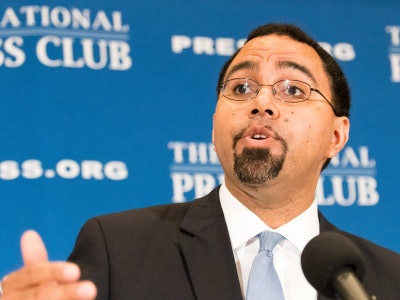WASHINGTON — Despite the increased emphasis that has been placed on preparing students to compete in the job market, the nation’s schools and colleges must be “bold and creative” when it comes to educating students for participation in civic life, U.S. Secretary of Education John B. King Jr., said Wednesday.
“Make preparing your students for their civic duties just as much a priority as preparing them to succeed in college and in their careers,” King said in a speech at the National Press Club.
 U.S. Secretary of Education John B. King Jr., said that students should be prepared to contribute “to the common good” as well as compete in the job market. (Photo courtesy of Noel St. John / National Press Club)
U.S. Secretary of Education John B. King Jr., said that students should be prepared to contribute “to the common good” as well as compete in the job market. (Photo courtesy of Noel St. John / National Press Club)King recalled how the Truman Commission on Higher Education recommended back in 1947 that education for civic life should be a paramount goal for higher education.
“That is just as true today,” King said. “But this goal too often has been forgotten at times, and at times education policymakers, educators, students and families have approached college as if its only worthwhile goal is as a means of success in the competitive job market.”
“But it has to be about more than that,” King continued. “Whether it’s K-12 education or higher education, we have to see it as preparing students, yes, for college and careers, and, yes, for civic participation, for citizenship, for caring about the common good and contributing to the common good.”
As an example of a math lesson that would teach students civic engagement, King suggested having students calculate the ratio of liquor stores and grocery stores to population in various neighborhoods, “and then asking the mayor why that is the case.”
King’s speech touched on topics that ranged from strained relations between the police and communities to the ongoing debate over the merits of charter schools.
Despite the prodding of reporters, King was careful to avoid some of the contentious politics of the 2016 presidential election — such as whether Donald Trump’s rhetoric has led to an increase in bullying in schools. Also, in a brief conversation with Diverse, King said he could not speak to whether he would continue as education secretary if Hillary Clinton wins the White House in November.
Instead, King spoke mostly from the standpoint of an orphaned child who had the good fortune to become a social studies teacher and then ascend into education administration at its highest levels. He also spoke as a father who, as of late, has been trying to explain the poor state of police-community relations to his two daughters.
“In the past year, we’ve had to talk to them a lot about the fact that the vast majority of police officers are dedicated public servants who are doing their best to keep people safe,” King said. “And at the same time, the reality [is] we’ve got to talk as a country about systemic issues of racism, prejudice and bias, and how they affect the relationship between police and the community.”
Responding to a question about how high school graduation rates have risen but in some cases test scores have fallen, King noted how as many as 80 percent of students in some community colleges must take remedial courses, “essentially high school classes while in college.”
“So we’ve got to figure out how graduating from high school really means ready for college and career,” King said.
King said the Every Student Succeeds Act that replaced the No Child Left Behind Education law has “created opportunities for states to develop plans on how to achieve” college and career readiness for their students.
“And we have tried to make clear that states have a responsibility to make sure those plans ensure opportunities for students in every community,” King said. “It can’t mean just [in] some places kids get access to college-ready coursework, and in others they don’t.”
He said one measure of success of the Every Student Succeeds Act will be how states “close those equity gaps.”
Asked about the NAACP’s recent call for a moratorium on charter schools until they are subjected to the “same transparency and accountability standards as public schools,” King said it would be unwise to restrict charters since many do a better job at sending students to college.
“We are fortunate, I think, as a country, to have high-performing charters that do a great job of finding great opportunities for students, charters that are helping students not only perform at a higher level academically but go onto college at higher rates than demographically similar students and succeed there,” King said. “That’s good. We should have more schools like that. And I think any arbitrary cap on the growth of high-performing charters is a mistake in terms of our goal of trying to improve opportunity for all kids.”
At the same time, where states are doing a poor job of authorizing charter schools, “that has to change,” King said, noting that the Obama administration has provided resources to improve the quality of authorizing charter schools.
“To the extent that what folks are saying, they want states to do a better job of charter authorizing, I agree,” King said. “But where we have states that are doing a good job of charter authorizing, we have charters that are doing a good job for kids that want to grow — they should be able to.”
Jamaal Abdul-Alim can be reached at [email protected] or follow him on Twitter dcwriter360.


















